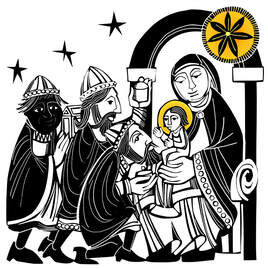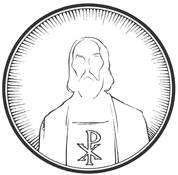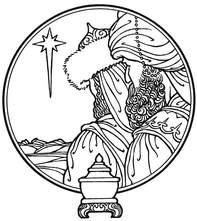The Lord God Is Manifested in the Incarnate Son
The Feast of the Epiphany centers in the visit of the Magi from the East. In that respect, it is a “Thirteenth Day” of Christmas; and yet, it also marks the beginning of a new liturgical season. While Christmas has focused on the Incarnation of our Lord—that is, on God becoming flesh—the season of Epiphany emphasizes the manifestation or self-revelation of God in that same flesh of Christ. For the Lord Himself has entered our darkness and rises upon us with the brightness of His true light (Is. 60:1–2). He does so chiefly by His Word of the Gospel, which He causes to be preached within His Church on earth—not only to the Jews but also to Gentiles (Eph. 3:8–10). As the Magi were guided by the promises of Holy Scripture to find and worship the Christ Child with His mother in the house (Matt. 2:5–11), so does He call disciples from all nations by the preaching of His Word, to find and worship Him within His Church (Is. 60:3–6). With gold they confess His royalty; with incense, His deity; and with myrrh, His priestly sacrifice (Matt. 2:11).
0 Comments
Jesus is Transfigured and Manifests His Glory The Lord appeared to Moses in the light of the burning bush (Ex. 3:1–14). Later Moses’ face would shine with the light of God’s glory when he came down from Mount Sinai (Ex. 34:29–35). At the Transfiguration, Moses and Elijah appeared with the One who is the Light of Light Himself (Matt. 17:1–9). Jesus’ glory as God shines with brilliant splendor in and through His human nature. By this epiphany, our Lord confirmed the prophetic word (2 Pet. 1:16–21), revealing that He is the fulfillment of the Law and the Prophets. He manifested His majesty as the eternal Son of the Father, and He wonderfully foreshowed our adoption as sons (Collect). We who have been baptized into Christ’s body are given a glimpse of the glory that we will share with Him in the resurrection on the Last Day.
The Lord God is Manifested in the Incarnate Son
The Feast of the Epiphany centers in the visit of the Magi from the East. In that respect, it is a “Thirteenth Day” of Christmas; and yet, it also marks the beginning of a new liturgical season. While Christmas has focused on the Incarnation of our Lord—that is, on God becoming flesh—the season of Epiphany emphasizes the manifestation or self-revelation of God in that same flesh of Christ. For the Lord Himself has entered our darkness and rises upon us with the brightness of His true light (Is. 60:1–2, First Lesson). He does so chiefly by His Word of the Gospel, which He causes to be preached within His Church on earth—not only to the Jews but also to Gentiles (Eph. 3:8–10, Second Lesson). As the Magi were guided by the promises of Holy Scripture to find and worship the Christ Child with His mother in the house (Matt. 2:5–11, Gospel), so does He call disciples from all nations by the preaching of His Word, to find and worship Him within His Church (Is. 60:3–6). With gold they confess His royalty; with incense, His deity; and with myrrh, His priestly sacrifice (Matt. 2:11).
Divine Service ~ January 8, 2016 ~ The First Sunday after Epiphany – The Baptism of Jesus (Observed)1/8/2017  The long-expected Christ has arrived; the waiting is over as the Son of David is anointed. The Father’s approval sounds from heaven and book-ends the season of Epiphany, when, with the Holy Spirit and with power, it thunders again on the Mount of Transfiguration as the Son is revealed in glory.
 On January 6, the Church celebrates the Feast of the Epiphany of our Lord. This feast commemorates no event but presents an idea that assumes concrete form only through the facts our Lord's life. The idea of Epiphany is that the Christ who was born in Bethlehem is recognized by the world as God. At Christmas, God appears as man, and at Epiphany, this man appears before the world as God. That Christ became man needed no proof. But that this man, this helpless child, is God needed proof. The manifestations of the Trinity, the signs and wonders performed by this man, and all his miracles have the purpose of proving to men that Jesus is God. Lately, especially in the Western Church, the story of the Magi has been associated with this feast day. As Gentiles who were brought to faith in Jesus Christ, the Magi represent all believers from the Gentile world.
Our human inclination is to listen without faith. This can only lead us to the brow of a cliff and throwing Jesus out of our lives. But the Savior of the Nations comes with his gracious words of redemption and membership in his body. The Word of the Lord is proclaimed through the revelation of his Anointed One. In him faith is rooted, love flourishes, and salvation is known from generation to generation. In today’s Gospel and sermon, we see that the gracious words of the Anointed One win admiration but not hearts of faith. When confronted by their own unbelief and the inclusion of Gentiles in spiritual Israel, “Joseph’s son” is driven from the synagogue to be thrown from the cliff. Yet the Savior of the nations passes through the angry mob to continue his mission and reveal himself in Capernaum.
Jesus reveals himself as the Anointed one with the Father’s authority to proclaim himself as fulfillment of prophecy. The Word made flesh points to the Word and boldly proclaims, “Fulfillment.” This bold proclamation carries joy to the very heart of the body of Christ and emboldens its members to proclaim the same.
Jesus comes as the invited guest to reveal the splendor of his glory. As we behold his glory, we delight in our bridegroom. For he delights in us, bringing to us his righteous deliverance, the strength of his Spirit, and the divine dimensions of his immeasurable love.
The Eastern Church celebrates January 6th as the Nativity of our Lord. For the West, the Epiphany of Our Lord is the continued celebration of the birth of the Savior of Nations. So bright is the dawning of the Son, so great is the fullness of his glory, that his light not only fills the dark streets of Bethlehem, but the ends of the earth. Jew and Gentile alike gather to worship him who is born ruler of Judah and Shepherd of all Israel.
|
Archives
February 2019
Categories
All
|
||||||||||||||||||||||||||||||||||||||||||||||||||||||

 RSS Feed
RSS Feed
